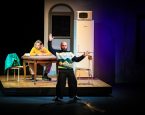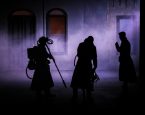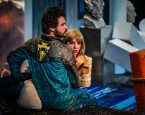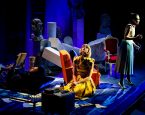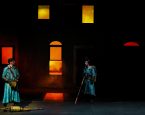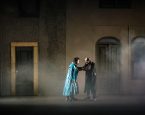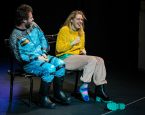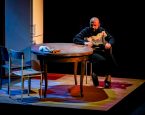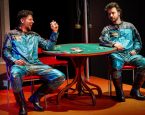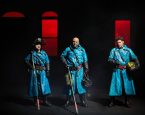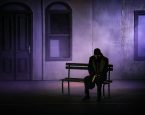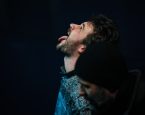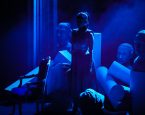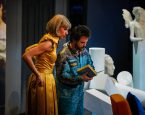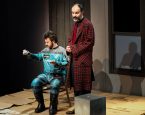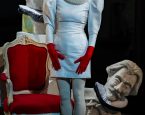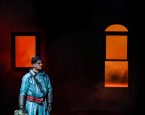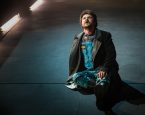
Premiere FAHRENHEIT 451Ray Bradbury
FAHRENHEIT 451 by Ray Bradbury is performed with the permission of DON CONGDON ASSOCIATES, INC.
Copyright @ 1953, renewed 1981 by Ray Bradbury
Ivan Penović, one of our most prominent drama artists of the new generation, will dramatize and direct a frightening vision of the future in which the authorities declare reading books a serious crime. This play, based on Ray Bradbury’s novel Fahrenheit 451, now a classic of world literature, will present a dystopian story that thematizes the burning of the past in favor of a healthier and more equal future. The path of the main character Guy Montag is ideally placed in our time, a time defined by a transitional waiting period, a time that in favor of tolerance and transparency of rights begins to fear diversity, freedom of choice and a past we do not necessarily have to be proud of to remember.
451℉ = 233℃ – the temperature at which book paper catches fire and burns
The show lasts approximately 2 hours and 40 minutes, and is performed with one intermission.
You are members of our Rijeka Symphony Orchestra and we are used to seeing you playing classical music. How was it for you to compose music for a theatre drama play? Have you had similar experiences before, or is this something completely new?
Well, the orchestra is such a big ensemble that each individual goes unnoticed; it is pure teamwork. Composing and playing in small ensembles such as our duo is also a musical experience, but completely different. Even before we met each other we were always interested in extending our skills as musicians in many multidisciplinary ways related to music. The show’s success or failure rests entirely on our shoulders, at least as far as the music is concerned. And we liked this risk. A lot!
Sometimes it was stressful from a timing standpoint – the deadlines were quite short once the play was completely finished, and we had to cut or extend tracks, or rewrite things that didn’t work. But we both enjoyed the whole process very much.
We both have experience in theater music and collaborating with actors and dancers, but it was either improvisation (in the videos during the pandemic for which we both played) or written music. Now we had to combine both of them.
The play Fahrenheit 451, based on the eponymous literary classic by Ray Bradbury, tells the world of the future, which implies the advancement of technology and the abundance of information. How did you highlight that time lag through music? Does this mean that you also used modern technologies available today when creating the music?
We are happy that you asked this question. It is a good example of well-written fiction and a prognosis of the future that now looks like absolute reality rather than fiction, even 60 years later. From the beginning, Penović wanted a mix of old and new in the music, while in Bradbury’s novel, old traditions (especially all forms of art) and relics are lost or forbidden.
That all led us to choose Retrofuturism as a genre direction. We used traditional instruments from Africa and the Middle East, together with the European tradition and coloured by newer music technologies: synthesizers, electric effects, loop pedals…
Do you otherwise like science fiction? What inspired you?
It is actually funny that we both love it! From space adventures to dystopian future and scientific future-realism. Inspiration came, of course, from the books and movies. We didn’t have an orchestra to record, so we had to adapt the ideas to our possibilities. So from the beginning, John Williams wasn’t an option 😊. Maybe Hans Zimmer, Vangelis, or Hildur Guðnadóttir.
What was your collaboration with the director and dramaturge Ivan Penović? Was his way of creation close to you?
We met him two years ago during the process for Real Comedy (Prava Komedija), even though we didn’t collaborate with him for his piece in that project, we had an opportunity to meet him and see the way he works (in this particular genre, an Omnibus with 10 directors and 10 short plays).
Since we received the offer to compose music for Fahrenheit and once rehearsal started, we were in close contact, and we went to the rehearsals to see the timing and the meaning of every scene we had to musicalize. In this project, we have to adapt ourselves to the big picture, so everytime we recorded something on the piano and violin we showed it to him, and waited for his approval or suggestions for changes.
It was a pleasure to listen to and work with Ivan, as he gave an interesting analysis of Bradbury’s novel and explained the way he [Ivan] wanted to interpret it. Thus, one of the basic musical goals was to find a main melodic line that would, with variations, follow the path and development of the main character Guy Montag.
How did you share the roles with each other? Is it a joint composition or did each of you create certain parts?
We would both sit behind the piano, or use the violin and marimba and other percussion instruments and improvise with the text . We recorded many samples, then we chose what we thought would be best. Even when we would each go home and work on our own, we exchanged musical updates with each other remotely. As you can see, we even answer questions together. 😊
And of course Saša Predovan, sound engineer of our Theatre, also had a big part in this process, as he patiently helped us a lot in realizing our whole idea, recording it, editing it and designing it.
So the audience of the play Fahrenheit 451 can expect music of the retrofuturist genre. Would you like to say something to the audience who is coming to the show?
That’s right, retrofuturism with elements of dystopian film music would be a good description of the genre. But it’s difficult for us to classify music. We recommend for the audience to try to see everything in their own individual way, because each of us accepts and rejects, loves and hates different things.
We would especially recommend for high school students to attend the performance, as it is a good opportunity to see the visualization of this novel with actors, music, decorations and lights. We also hope that, after watching this play, they’ll be interested in reading the novel if they haven’t already. 😊
Conversation with Julia Vazniak
Sponsors


